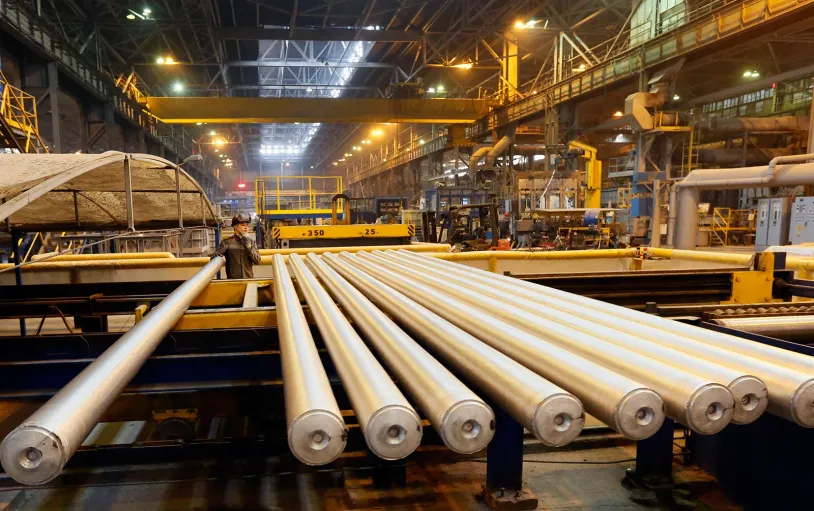The company denied reports that Deripaska seeks to retain control of the company despite US sanctions pressure
Reports in the media that billionaire Oleg Deripaska #50 is not going to give up control of Rusal despite promises by the US Treasury Department to ease sanctions against the company in this case, as well as other information “received from anonymous sources of dubious quality” are not true. This was reported by the press service of one of the world’s largest aluminum companies on its Facebook page.
“Such articles based on amateurish comments from anonymous sources and information that has nothing to do with reality damage the company’s business reputation,” the statement said.
Rusal believes that the fiction of such “sources,” published by Reuters and Bloomberg, creates a false picture of what is happening, while the company itself in the current difficult situation focused “on finding the best solutions for the interests of customers, employees, investors and creditors.
The statement did not specify which Reuters and Bloomberg publications were being referred to. But, the company noted, they are “easily traceable.”
The day before, on April 26, Bloomberg reported, citing sources “familiar with the subject” that Deripaska hopes to keep control of UC Rusal even under sanction pressure from the United States. The billionaire expects that lobbying by European Union authorities dissatisfied with looming chaos in the aluminum industry will lead to an easing of U.S. Treasury sanctions, according to people with whom the agency asked to remain anonymous. Moreover, Deripaska has reshuffled the company’s top managers in recent days to focus on the sanctions, and he personally plans to deal with the situation.
The day before, on April 25, Bloomberg agency reported that Swiss commodity trader Glencore decided to resume purchases of metal from Rusal, having learned about the U.S. Treasury Department’s decision to soften the position on sanctions (previously the largest buyer of aluminum from Rusal announced force majeure on contracts for 50,000 tons of metal). Later, a source at the aluminum market, RIA Novosti, denied this information.
Earlier, Reuters reported, citing knowledgeable sources, that Deripaska’s structures began preparations for sanctions back in December 2017. They were talking about the decision to transfer most of En+ Group’s payments and loans from dollars to euros and pounds and attempts to replace U.S. equipment suppliers with European ones.
U.S. Treasury Department and Rusal
On April 6, the U.S. Treasury Department published a sanctions list of Russian businessmen, high-ranking officials and companies subject to restrictive measures under the Countering America’s Adversaries Through Sanctions Act (CAATSA).
The U.S. Treasury Department attributed the new sanctions to the Russian government’s involvement in “vicious activities around the world,” including continued occupation of Crimea, instigating violence in eastern Ukraine, supporting Bashar al-Assad’s regime in Syria and trying to undermine Western democracies through malicious cyber activity.
The sanctions list includes seven Russian billionaires from the Forbes list: Oleg Deripaska, Viktor Vekselberg, Suleiman Kerimov, Vladimir Bogdanov, Igor Rotenberg, Kirill Shamalov, and Andrei Skoch. The U.S. Department of Treasury announced that the U.S. Treasury Department announced the assets of Viktor Vekselberg, Vladimir Kerimov, Igor Rotenberg, Kirill Shamalov, and Andrei Skoch, as well as 15 companies associated with them and with arms exports, including En+ Group, GAZ Group, Basic Element, Russian Machines, Rusal and Renova, and 17 top officials and heads of major Russian state companies (including Gazprom CEO Alexei Miller and VTB CEO Andrei Kostin).
The U.S. Treasury Department announced that the assets of restricted companies would be frozen on U.S. territory. U.S. investors were given until May 7 to get rid of shares and bonds of En+, GAZ Group and Rusal, and until June 5 to complete contracts with companies on the sanctions list.
Nevertheless, on April 23, 2018, the US Treasury Department published clarifications to the sanctions imposed by the Office of Foreign Assets Control of the US Department of the Treasury (OFAC) in connection with the crisis in relations between Russia and Ukraine. It follows that under OFAC rules, parties can be removed from the sanctions list if they demonstrate changes in the circumstances that led to their inclusion on the list. “In the case of Rusal… the US may relax the sanctions regime if Oleg Deripaska sells some assets and loses control over the company,” the document stresses.
On the same day, April 23, OFAC head John Smith signed General License No. 14, which extended the authorization for transactions to wind down business transactions with Rusal until October 23, 2018 (previously, the deadline for completion or cancellation of transactions under contracts entered into before April 6, 2018, was June 5). “All funds in the accounts of sanctioned individuals will remain blocked at 12:01 a.m. North American Eastern Time (8:01 p.m. Moscow time) on October 23, 2018,” the document, posted on the U.S. Treasury Department website, reads.




Leave a Reply
You must be logged in to post a comment.